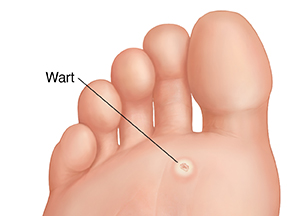Understanding Plantar Warts
A plantar wart is a small, non-cancerous growth on the bottom of the foot. Plantar warts often develop where friction or pressure occurs, such as on the ball of the foot. The word plantar refers to the sole of the foot. Similar warts can occur on other areas of the body, such as the hands. Plantar warts are more common in children and young adults.

What causes a plantar wart?
Plantar warts are caused by a virus called HPV (human papillomavirus).
They can be spread by person-to-person contact. Or you can develop one if you walk barefoot on moist surfaces, such as around swimming pools, infected with the virus. This might be in a community pool area or locker room. Wearing the correct footwear in such places can prevent them.
What are the symptoms of plantar warts?
Plantar warts cause a thick, rough, and often raised patch of skin on the bottom of the foot. The wart may have black dots on it. These dots are dried blood. The wart may cause pain or discomfort when walking. You may have trouble walking because of the pain.
How are plantar warts treated?
Many plantar warts go away without any treatment. But for those that are painful or that don’t go away, several treatments are available. The most common treatments include:
-
Salicylic acid. This is put directly on the wart. It may come in the form of a liquid, ointment, pad, or patch. It's available over the counter. Don't use salicylic acid treatment for more than 12 weeks without talking with your healthcare provider.
-
Cryotherapy. Your provider puts liquid nitrogen on the wart with a cotton swab or spray. This treatment might be painful.
-
Laser treatment. Involves the use of laser light to heat and destroy blood vessels within the plantar wart, cutting off its blood supply
-
Immunotherapy. Uses a topical chemical like diphencyprone to cause a mild allergic reaction. This will prompt the immune system to eliminate plantar warts caused by HPV.
-
Electrocautery. A procedure where a weak electric current is applied to burn off plantar warts, effectively removing them.
Other treatment choices include topical cantharidin and surgery. There are many folk remedies for plantar warts, but some of these are unproven and can be dangerous. Talk with your provider about safe methods to try. Often your provider will cut away dead parts of the wart before using other treatments.
When should I call my healthcare provider?
Call your healthcare provider if you have plantar warts that: